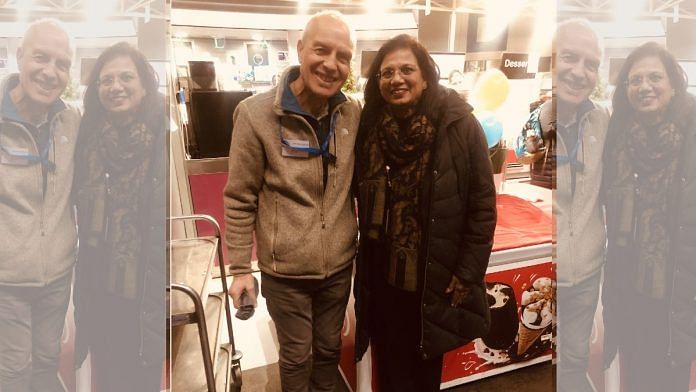Bhopal: Science does not operate in silos. Wars, geopolitical shifts and politics can affect research and CERN (European Organization for Nuclear Research) — which has decided not to renew its collaborations with Russia after 2024 in solidarity with Ukraine — is testimony to this.
However, the organisation is constantly “working to keep science above politics,” according to Archana Sharma, principal scientist at the department of physics at CERN and one of the 27 recipients of this year’s Pravasi Bharatiya Samman Award. She was speaking on the sidelines of a media interaction at the 8th India International Science Festival (IISF) in Bhopal Monday.
In addition to the war’s effects on science, Sharma also discussed an upcoming upgrade to CERN’s Large Hadron Collider (LHC), and the opportunities this could bring for India’s scientists and industry.
“We will be stopping for a major upgrade after 2025 for three years, which is a very huge opportunity for scientists in India to participate not only in the physics experiments but also in the engineering, installation and commissioning,” she said.
“For the future machines also, there is a lot of participation going on from India — from RRCAT, Variable Energy Cyclotron Centre (VECC) in Kolkata, Bhabha Atomic Research Centre (BARC) in Mumbai.”
Highlighting past contributions of Indian scientists at CERN, Sharma added, “There are fantastic scientists in India in terms of theoretical physics. We have people participating at CERN from the 1960s from TIFR (Tata Institute of Fundamental Research, Mumbai). From the 1990s, there were more coordinated attempts at making people part of experiments in CERN.”
She also recalled how the Raja Ramanna Centre for Advanced Technology (RRCAT), Indore, had built some of the components for CERN. The corrector magnets — which are used to correct the trajectory of the electron beams — were developed in 1996 with the help of industry in Indore, she said.
Also Read: At IIT Kanpur, engineers are working on an artificial heart that’s affordable & built to last
How war affected science
In the context of the Ukraine-Russia war, Sharma said that for over a year, there has been a debate on how to acknowledge the work done by Russian scientists. “A lot of our work at CERN has been done by scientists from Russia. Their work is not to be neglected.” she said
“Although science should be above politics, there are people working in Ukraine as well. People who are working in Ukraine have their own arguments, all the European member states have their own arguments. We want to remain neutral in order to keep science above politics,” she said.
The war has also led to a drop in the number of publications from CERN, with researchers from many member states reluctant to share authorship of scientific papers with their Russian peers.
“The number of publications (at CERN) has gone down during the war. Many of the publications are in the preprint mode, waiting for the policy to be agreed on,” added Sharma.
Also Read: Armed with science & tech solutions, govt & IIT-Delhi come together to fight air pollution
Upgrading LHC & new project
Explaining why continuous work on upgrading the LHC is needed, Sharma said that although the discovery of the Higgs Boson in 2012 has “sort of” completed the standard model of physics, there’s still plenty left to understand about how the particle behaves, how it interacts with other particles, and if there’s more than one kind of Higgs Boson.
“There are many questions left unanswered, such as: Are there any candidates for dark matter?” Sharma said.
The LHC has already collected 10 years’ worth of data on the Higgs Boson, and scientists from various organisations are already working on it.
However, CERN will now upgrade the Large Hadron Collider; afterwards, it’ll be called the High Luminosity LHC. “It will be collecting 10 times more data than we have already collected,” Sharma said.
Sharma works on building gas electron multiplier (GEM) detectors at the LHC; she has built two such detectors over the past 10 years.
“We need to now just duplicate that with another four stations. Those four stations are now being built as we speak and they will be installed sequentially over the coming years – by 2025 to 2026 – to be ready for the next run of the LHC.” She has built a team of very young physicists who are helping to build these stations, she said.
Moreover, Sharma is also working on making the experiments more environment-friendly.
Currently, the older detectors have to be filled with gases containing freons. Freons are chlorofluorocarbon (CFC) compounds that contain only carbon, chlorine, and fluorine, produced as a volatile derivative of methane, ethane and propane. CFCs are known to be ozone depleters.
“We are using detectors that have been running for decades. These detectors may fail, and in any case they are already becoming obsolete,” she said.
“Now, the GEM detector has already got rid of freons; it is one step towards greening the gas detectors. More R&D is going on, on the mitigation of the present detectors so that they can be operated without the freons,” she added.
There’s also an ambitious plan to build a new, much larger collider — the Future Circular Collider (FCC), with a 100-km circumference — in Geneva.
The collisition energies within this new collider would be multiplied several times — and so would the funding requirements, Sharma said. Currently, there are ongoing feasibility studies for the project.
Also Read: World’s 1st Covid nasal vaccine by Bharat Biotech to launch on R-Day, says founder Krishna Ella



